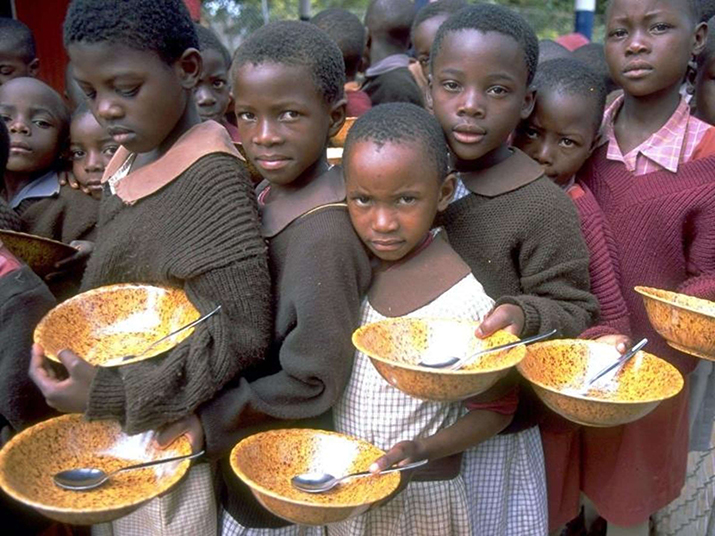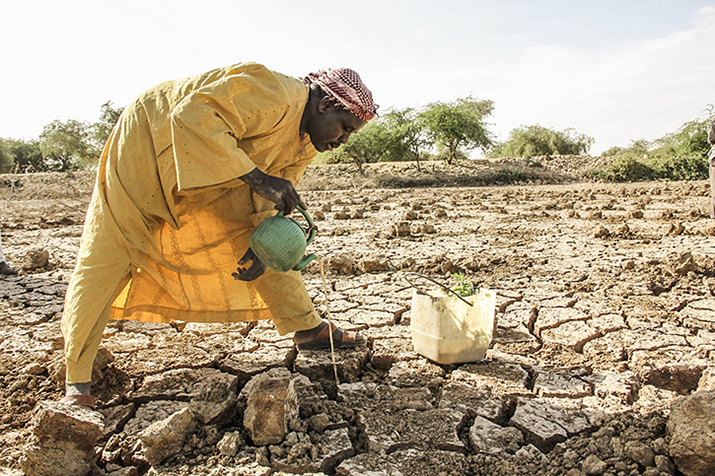WORLD FOOD PROGRAMMME
THE DIRECT RELATIONSHIP BETWEEN POLITICAL STABILITY AND FOOD SECURITY
Many children go to bed without dinner even though they have not been in trouble. Sometimes they even skip lunch. Never mind breakfast. Their parents are normal people who only want the best for their children. The best though, in some areas of the world, simply means getting two meals a day and clean water. It doesn't matter if it's hot as long as it's safe to drink. It seems obvious in our country where the main problem is obesity but it is not so for the nearly 700 million people who go to bed every day on an empty stomach.
They would gladly work if they had a piece of land to cultivate and water to irrigate it. With even more enthusiasm if in the meantime no one bombed them or if an anti-personnel mine placed by some armed group to stop the advance of child soldiers did not explode with each movement of their hoe. They would work but they can't because there is shooting all around.
If you don't work, you don't eat. If you don't eat, you don't think and so after a while you are willing to do anything, even to fight, to besiege cities and to chase away hungry people like yourself. It's a vicious circle, because even those who run away don't have enough food, and if they run and find a rifle, they pick it up and then ... if you don't have dinner to give your child, you shoot.
War and hunger go hand in hand. Nearly 60 percent of people who do not eat regularly live in areas where armed conflict occurs. And it is precisely the clashes between opposing countries or factions that represent the greatest obstacle to achieving "Zero Hunger", the second of the seventeen goals set by the international community in 2015 in order to work towards the achievement of sustainable development by 2030. We are running very late and we are not dealing with it enough as malnutrition is not at the center of the political agenda in areas where the problem is being overweight. In particular, there is little commitment to promoting sustainable agriculture. The World Food Programme is focusing on this and received the Nobel Peace Prize in 2020 precisely because it works on bread and water, the two main tools to be used in order to stop wars.
War and hunger go hand in hand. Nearly 60 percent of people who do not eat regularly live in areas where armed conflict occurs
But the road is long because, in addition to those who do not eat at all, there are also those who live in a regime of acute food insecurity. In 2019 135 million individuals, distributed in 55 countries, were afflicted by this problem. Even more people, one in three, suffer from some form of malnutrition. The repercussions are very serious. The lack of food not only affects the health of individuals, but also slows down the economic progress and education of all. If you are poor and cannot even study the possibilities of improving your living conditions are reduced to almost zero. It is difficult to struggle to increase the income of your family and live with peace of mind without hating anyone because you think they are taking away something that belongs to you. Limited resources means more wars, and it is for this reason that assistance to those trapped in areas of armed conflict, to those living under siege or to those fleeing after abandoning their house destroyed by the bombing, is not only solidarity, but also a step towards Peace, a way to give hope and alleviate further tensions that could quickly turn into new clashes.
Hunger and war are Siamese twins, the kind that no surgeon can separate. Either you fight them together or you get sucked into a vortex with no way out. "Conflicts can cause food insecurity and hunger, just as hunger and food insecurity can ignite latent conflicts and trigger violence", expressed the Norwegian Nobel Committee in the motivation for the prize awarded to the World Food Programme. And unfortunately it's not even a new thing because we already knew about it. It is written in black and white in the Resolution 2417 of the United Nations Security Council, adopted in May 2018, which maintains that without a general ceasefire the world will never be able to solve the problem of nutrition. The same text prohibits the use of hunger as a weapon of war, banning the hateful practice based on the siege of entire populations who are prevented from accessing food supplies to exhaust the fighters and convince them to surrender. This too is old history. From Troy onwards there have been hundreds of besieged cities. For more than two thousand years, Homer has told us that in the end they all lose, but it was not enough. Charlie Chaplin also tried in his final speech in "The Great Dictator", but the "Iliad" is long and the cinemas are closed.
Lack of food not only affects health but also slows economic progress and education
The fact remains that there are many areas at risk and inadequate funding to counter the crisis. In 2018, when famine was looming in Yemen international intervention averted the worst but today millions of people in various areas of the country once again risk starvation. The same happens in other nations afflicted by conflict such as the Democratic Republic of the Congo, Nigeria or South Sudan. The preliminary results of research conducted jointly by the World Food Programme and the Stockholm International Peace Research Institute highlight the fact that even in El Salvador, Iraq, Kyrgyzstan and Mali there is a huge risk if an improvement in access to natural resources does not come about soon. There is need for water to irrigate, land to cultivate, clean air to breathe and fire, not that of weapons but that of the kitchen. The elements to defeat the war have always been the same for centuries. Homer already claimed this three thousand years ago. He was blind but some things he was certainly able to see.








